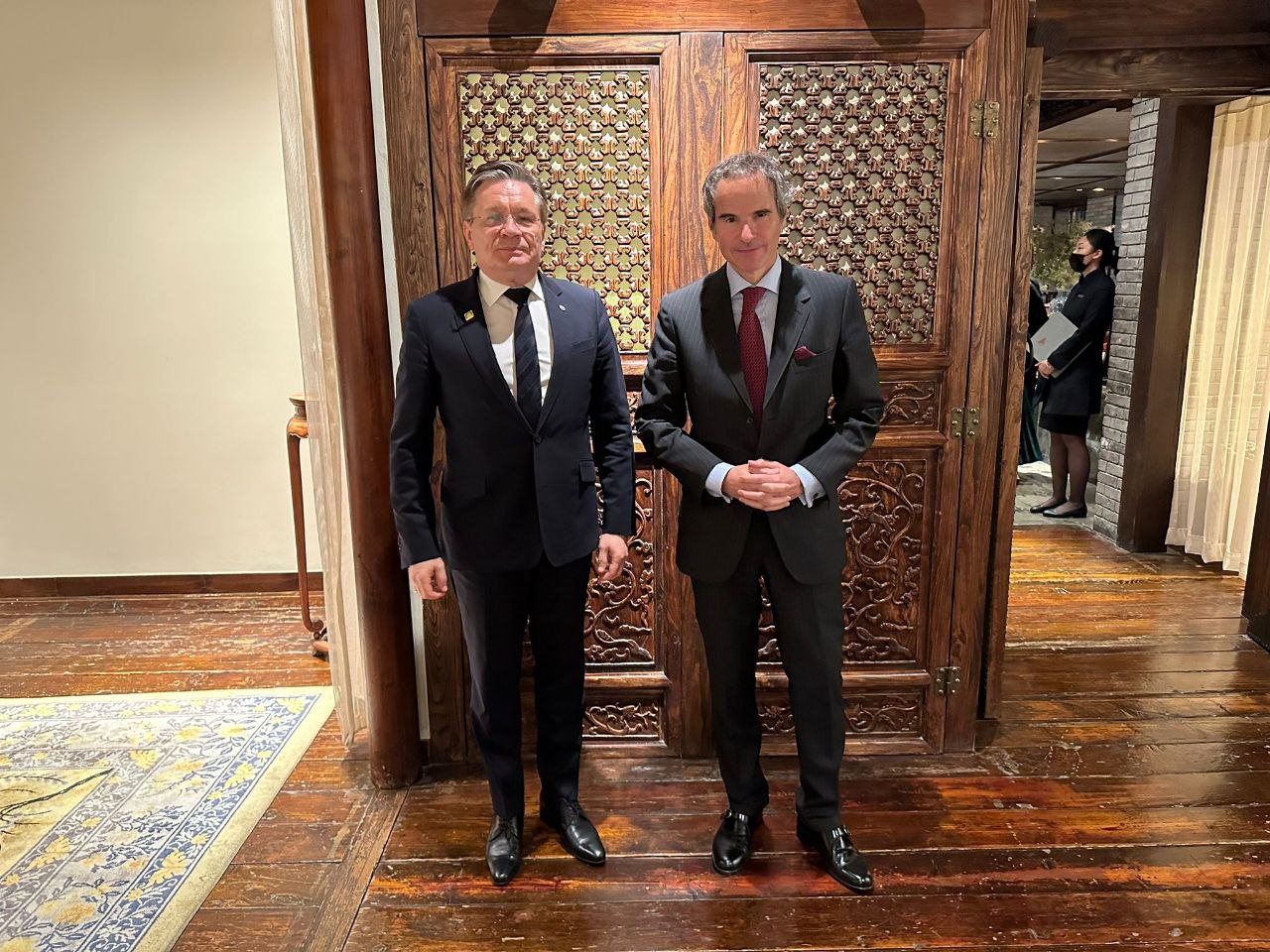 During his recent visit to China, International Atomic Energy Agency (IAEA) Director General Rafael Grossi discussed the situation at the Zaporizhia NPP (ZNPP) with both Chinese officials and Rosatom Director General Alexey Likhachev. Grossi is trying to win support for a UN Security Council meeting to discuss ZNPP later in May.
During his recent visit to China, International Atomic Energy Agency (IAEA) Director General Rafael Grossi discussed the situation at the Zaporizhia NPP (ZNPP) with both Chinese officials and Rosatom Director General Alexey Likhachev. Grossi is trying to win support for a UN Security Council meeting to discuss ZNPP later in May.
He has said he is seeking to secure agreement on a set of principles to protect ZNPP during the armed conflict, covering also the availability and security of external power supplies at all times. According to American and European diplomats, Grossi’s plan consists of five principles: a ban on the deployment of heavy military equipment and military personnel at nuclear power plants, a ban on shooting from the territory and towards the power plant, ensuring security, protecting all external power lines, and monitoring compliance with these principles.
Since Russia took control of ZNPP in March 2022, the Russian national guard has been protecting the station and in October, Russian President Vladimir Putin signed a decree formally transferring ZNPP to Russian jurisdiction under nuclear utility Rosenergoatom (part of Rosatom). A Russian Federal State Unitary Enterprise. Zaporizhia NPP was established by Rosenergoatom to operate the plant. However, Ukrainian nuclear utility Energoatom still claims ownership of the plant. Reports by Russian military analysts suggest that retaking control of ZNPP is one of the objectives of the coming Ukrainian offensive.
According to Rosatom, Likhachev, who was in China as part of a delegation led by Russian Prime Minister Mikhail held talks with Grossi in Beijing. Rosatom said they “continued the conversation, which has recently taken on a regular character, on the topical issue of interaction between Russia and the Agency” The main emphasis was placed on “issues related to the work of the IAEA mission at the Zaporizhia NPP site and, in general, to ensuring the safety of this plant”. Grossi informed Likhachev “on the progress of the implementation of his initiative in this direction”.
Meanwhile, Russian Deputy Foreign Minister Sergei Ryabkov told journalists: "There is and cannot be any reason to doubt our commitment to ensuring the guaranteed nuclear safety of the Zapoizhia Nuclear Power Plant. The question for Kiev is whether or not it is ready to take steps, including in the political sphere, to prevent shelling of this facility, to avoid attacks on the city of Energodar. In my opinion, the answer to this question is ‘no’.” He said the IAEA secretariat “should not hide behind vague phrases in the question of who is doing what and what events are taking place in this area, but clearly record that the station should not be shelled, there should be no attacks on the objects that ensure its functioning, there should be no destructive behaviour in the organisation and maintenance of a stable constant energy supply, etc.
He added: "We are bringing all this to the attention of the leadership of the IAEA secretariat and expect to continue doing so. How the situation will develop, and to what extent the Grossi principles will prove to be of practical use and applicability, the near future will show, above all in the behaviour of Kiev and its Western curators." Ryabkov confirmed that Moscow is in constant contact with Grossi on the issue of the station.
According to Russia’s Kommersant newspaper Grossi is trying to enlist the support of as many UN Security Council member countries as possible before unveiling his plan to protect ZNPP for discussion at the Council. “Russia and China seem to be sympathetic to his initiative. The United States, Great Britain and France, however, have so far refrained from unequivocal public comments on this topic.”
The day before his talks with Likhachev, Grossi also met with Chinese Foreign Minister Qin Gang, after which he thanked Beijing on Twitter for "resolute support" for its efforts to ensure the safety of the Zaporizhia NPP. “Thus, we can say that two out of the five permanent members of the UN Security Council, if not fully in support of the ‘Grossi plan’, they have no fundamental objections to it. The other three – the United States, Great Britain and France-have not yet publicly commented on this topic. But the main thing is that the position of Ukraine is not yet clear,” Kommersant noted.
Image: Director General of Rosatom, Alexey Likhachev has met with IAEA Director General Rafael Grossi in Beijing to discuss the situation at the Zaporizhia nuclear power plant in Ukraine (courtesy of Rosatom)






